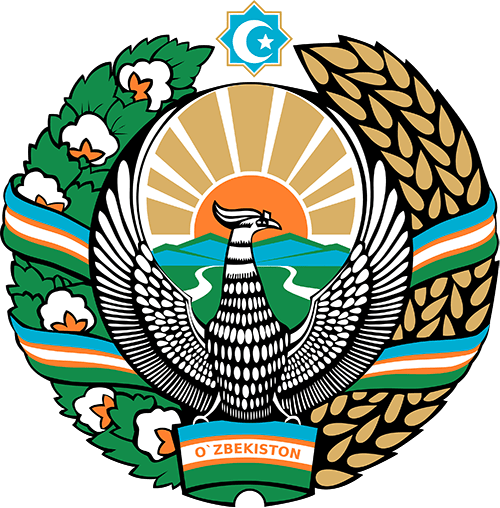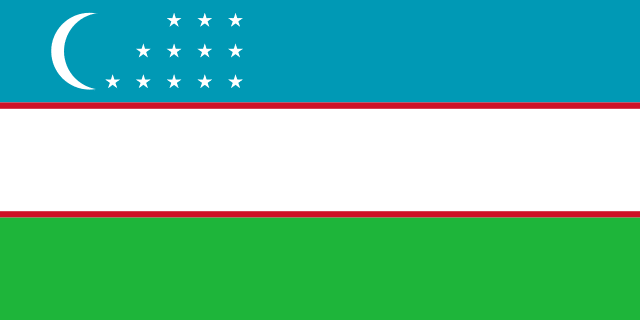Report on the stay of the delegation from Uzbekistan at the 10th EAN Congress in Helsinki from June 29 to July 2. From June 29 to July 2, 2024, the 10th Congress of the European Academy of Neurology (EAN) was held in the capital of Finland, Helsinki. The EAN Congress has always been a platform for professionals at all levels, from students to experts in the field of neurology, neuroscience, to showcase their research and build relationships that ultimately create a support network that promotes growth, instills confidence, and helps residents and fellows thrive in the field. the path they have chosen. A record number of delegates took part in the congress this year: 7092 offline participants and 1932 online participants from 123 countries. Department of Neurology, Child Neurology and Medicine. Genetics TashPMI represented by the head of the department and chief neurologist of the Ministry of Health of the Republic of Uzbekistan Majidova E.N. was presented among the congress participants. Also participants from our country were neurologists Prof. Rakhimbaeva G.S., Kim I.G. The specialists focused on advances in the diagnosis and treatment of neurodegenerative, cerebrovascular, autoimmune, demyelinating diseases of the nervous system, a modern view of pathogenetic mechanisms in autoimmune pathology, neuromodulation and others. Issues of modern approaches to the management of multiple sclerosis, myasthenia gravis, epilepsy, migraine and others aroused great interest among the delegates.President EAN Prof. Paul Boon began the session with an overview of the achievements of the society, which this year celebrates its tenth anniversary. He noted recent major achievements, including the development and publication of a strategic neuroscience research agenda for Europe that is clinically relevant and patient-centred for neurology patients. 43% of the disease burden is neurological in origin, and this burden entails an annual cost of €1.7 trillion in Europe, recent research shows. To address this issue, EAN has created new task forces, for example on environmental influences on neuroscience, an area that is still poorly documented.The opening ceremony of the congress in honor of the anniversary was held in a particularly creative way! The Resident and Fellow Section (RRFS), which represents the community of young neurologists who make up 52% of EAN members, chaired by Dr Alice Accorroni, has launched a neuroart competition. “Creativity and the arts can help you improve your wellbeing and brain health, which is at the heart of the EAN agenda,” said Dr Alice Accorroni. The audience was treated to a sensational experience. Belgian master chocolatier Dominique Persoone created the Chocolate Line laboratory in Brussels to explore the balance of flavors and study the effects of cocoa on the brain. New perspectives are opening up in the treatment of multiple sclerosis, in particular Frexolimab is considered as a possible very effective treatment method. A large pool of abstracts was presented in sections devoted to autonomic disorders and headaches. The congress program was very bright and eventful, which allowed each participant to achieve the main goal - improving knowledge and skills to improve the quality of diagnosis and treatment of neurological diseases.

REPORT ON THE MASTER CLASS ON THE TOPIC "POSTURAL MANAGEMENT" February 21, 2024 At the Department of Neurology, Child Neurology and Medical Genetics of Tashkent PMI, following the results of training of specialists in St. Petersburg, a master class was held on the postural correction program. The "Postural Management" program is aimed at teaching methods of verticalization and rehabilitation of children with movement disorders. According to this program, a master class and presentation of technical means of rehabilitation, a TEKT suit was given by the 2nd year resident of adult neurology A.B. Bizhanova; 1st year master's degree in adult neurology Radzhapov A.A and Ernazarov A.B. The types of verticalizers, the rules for installing rehabilitation equipment, the mechanism of action of the TEKT suit, indications and contraindications for use and algorithms for performing actions were also described in detail. We discussed postural management and its stages. No less important is night postural management, which involves selecting the optimal position of the child during sleep using special devices and mattresses. This allows you to avoid the occurrence of contractures and deformities at night. We studied various options for postural positions for sleeping, an algorithm for selecting supports for the limbs and torso. Thus, practical skills, a brief explanation of postural correction, and interaction with the audience were demonstrated. The main task was to show and explain the principles of operation of the Postural Correction technique.

REPORT ON THE INTERNSHIP IN ST. PETERSBURG UNDER THE PROGRAM "POSTURAL MANAGEMENT" by employees of the Department of Neurology, Child Neurology and Medical Genetics of TashPMI (Center for Medical Technologies and Rehabilitation from 12th to 16th February 2024) The “Postural Management” program is based on a memorandum between the Department of Neurology of Tashkent PMI and the Center for Educational Technologies at the SMART Academy (St. Petersburg) and is aimed at teaching methods of verticalization, postural correction and rehabilitation of children with movement disorders. The program was organized and fully funded by the management of the base of the Department of Neurology - the clinic "Reatsentr Tashkent" as part of the program for advanced training of specialists. The following students were trained under this program: 2nd year resident of adult neurology Bizhanova A.B.; 1st year masters of adult neurology Radzhapov A.A. and Ernazarov A.B.
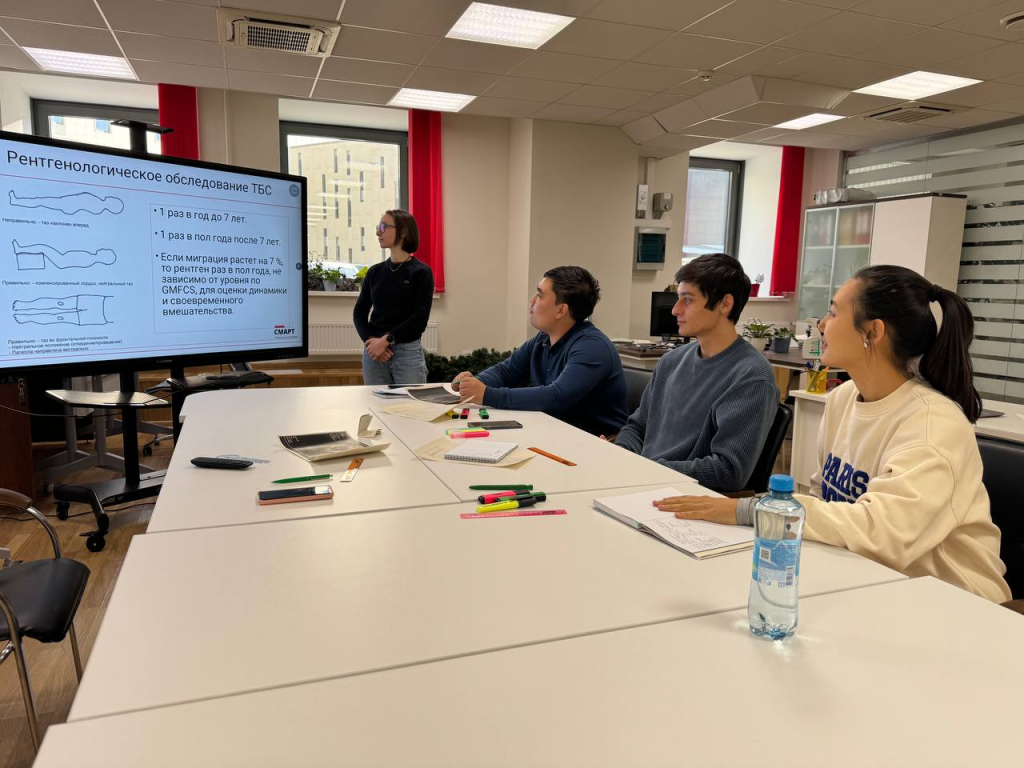
Starting from February 12th to 13th, training was conducted at the SMART Academy. Lectures on the basics of postural correction and the techniques used were held at the SMART Academy. Lectures on the basics of postural correction were given by the leading specialists of the center Valeria Viktorovna Bogomolova (deputy chief physician for postural management) and Vera Nikolaevna Ivleva (physical therapist, specialist in the fields of adaptive physical culture and reactionary rehabilitation).

Before verticalization began, we learned how to take measurements of the anthropometric parameters of children, as well as assess the mobility of their joints. This is necessary for correct placement of the child and selection of the optimal verticalizer.
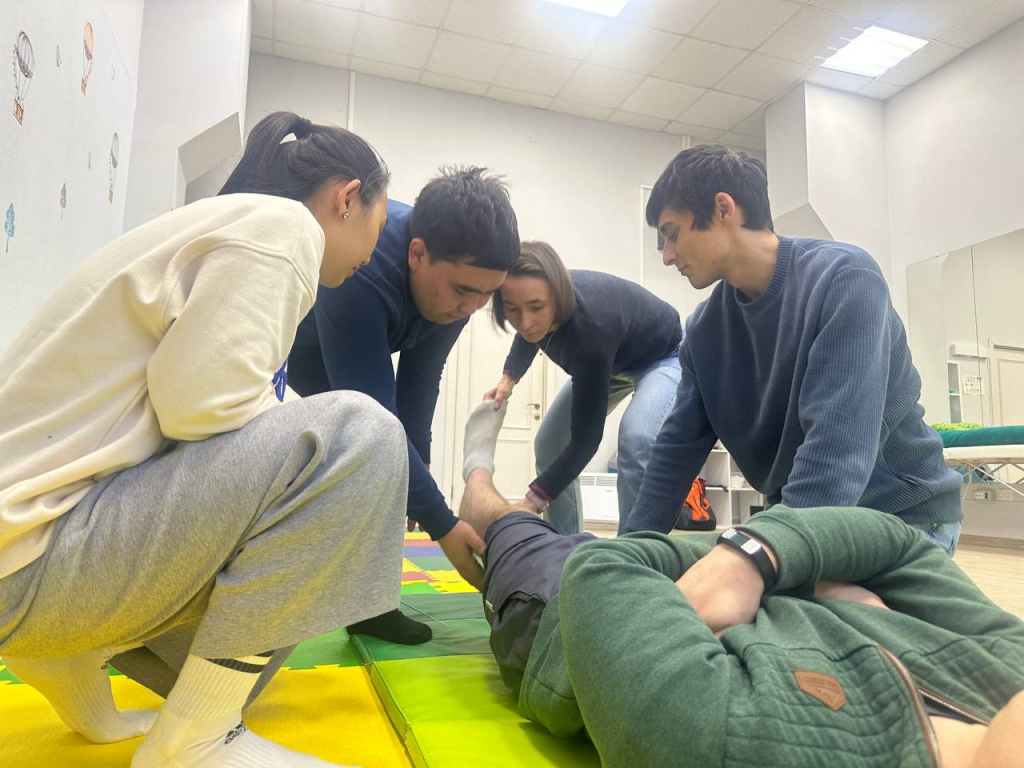
In addition to daytime postural correction techniques, a separate block of internship was devoted to nighttime postural management. Night postural management involves selecting the optimal position of the child during sleep using special devices and mattresses. This allows you to avoid the occurrence of contractures and deformities at night. We studied various options for postural positions for sleeping, an algorithm for selecting supports for the limbs and torso. In addition, the skills of placing children on specialized beds and rehabilitation mattresses were practiced.
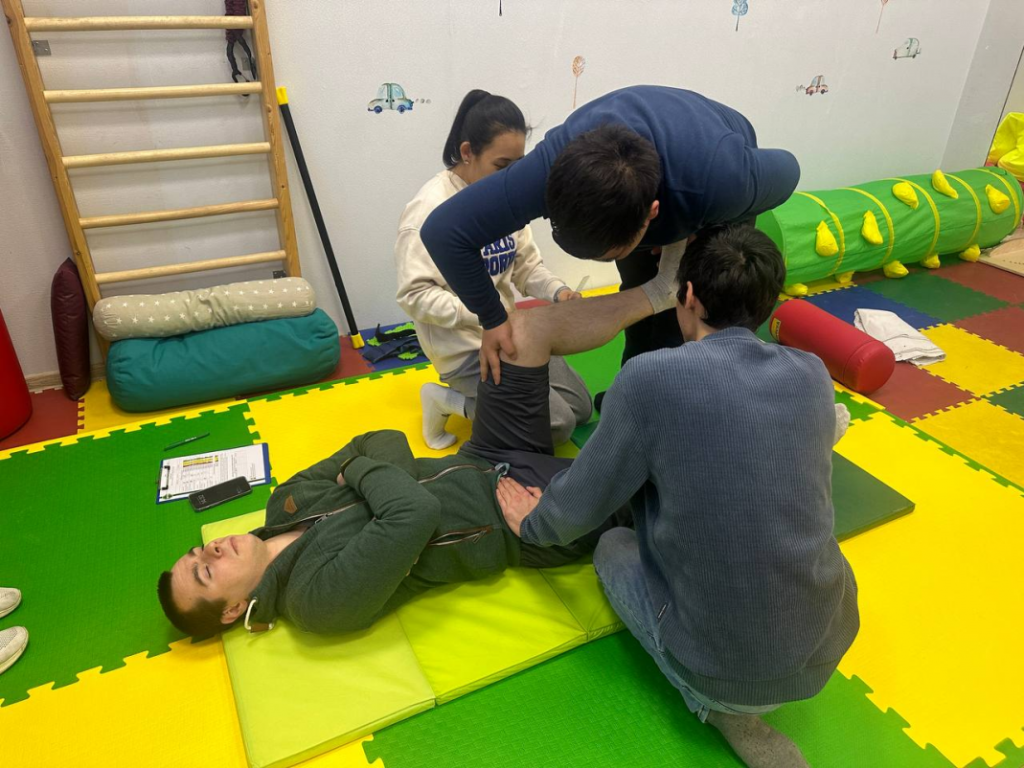
In addition to standard verticalizers, we practiced placing children on the TEKT suit (Trainer Exoskeleton Suit-Splint). To do this, we were shown the basics of programming the suit and setting up training modes in accordance with the individual needs of the child.
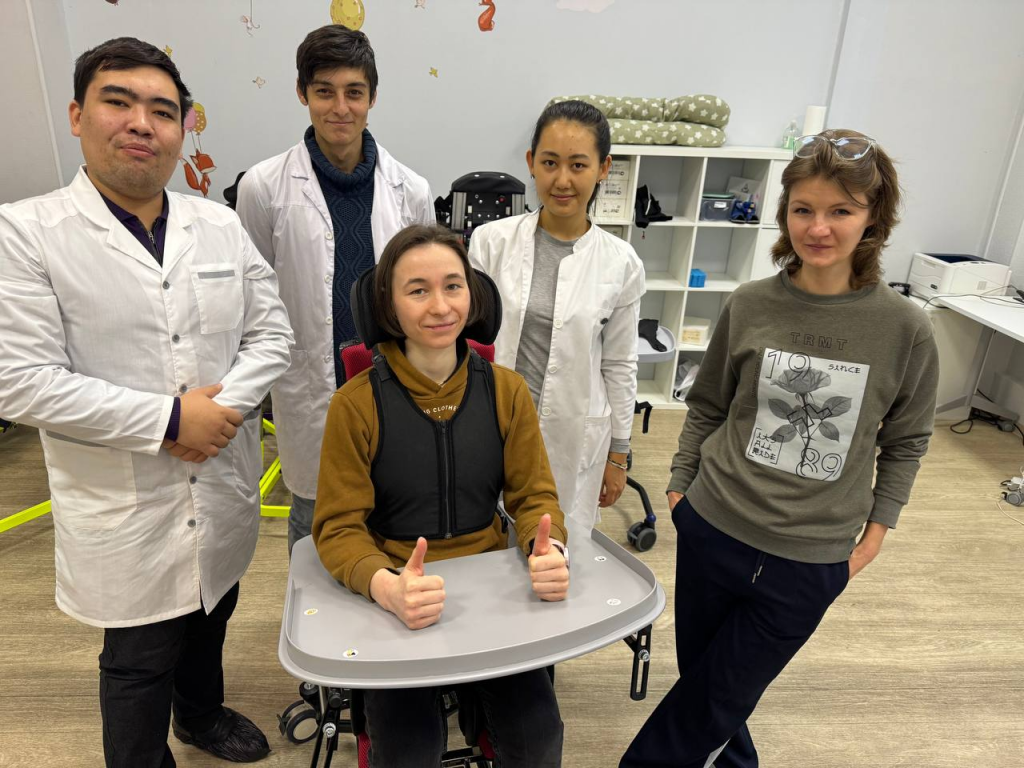
Thus, this internship allowed us to gain practical skills in placing children in an upright position using various equipment, as well as the principles of selecting the optimal means of rehabilitation in accordance with a specific clinical situation. This knowledge will be introduced into the practice of our rehabilitation center. The use of postural correction techniques and work in this direction with colleagues from St. Petersburg opens up new opportunities for adequate treatment of patients with movement disorders, which will lead to a reduction in disability.
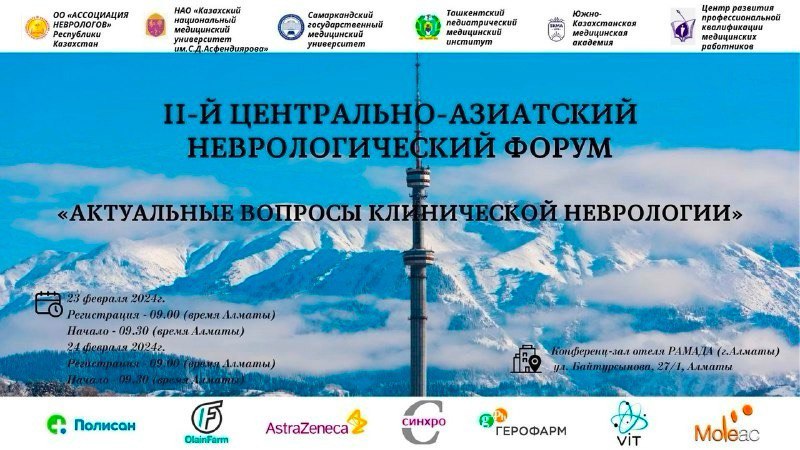
On February 23-24, 2024, the 2nd Central Asian Neurological Forum on the topic: “Topical issues of clinical neurology” will be held in Almaty in the conference hall of the RAMADA hotel.Professor E. N. Majidova will make a presentation at the Forum.
On February 14, 2024, a conference was held in the conference hall of the Reatsentr Tashkent clinic on the topic: “Current issues in vascular neurology.” Lectures by Professor E. N. Majidova were heard. on the topics: “Features of stroke in the elderly” and “Myasthenia: problems and solutions.” Litus A.Yu. (St. Petersburg) “Application of the author’s technique of postural correction in neurorehabilitation of patients with movement disorders.” Gusak T.Yu. (St. Petersburg) “The role of innovative technical means in neurorehabilitation.” A master class was held on the use of technical means of rehabilitation and integration into the rehabilitation route.
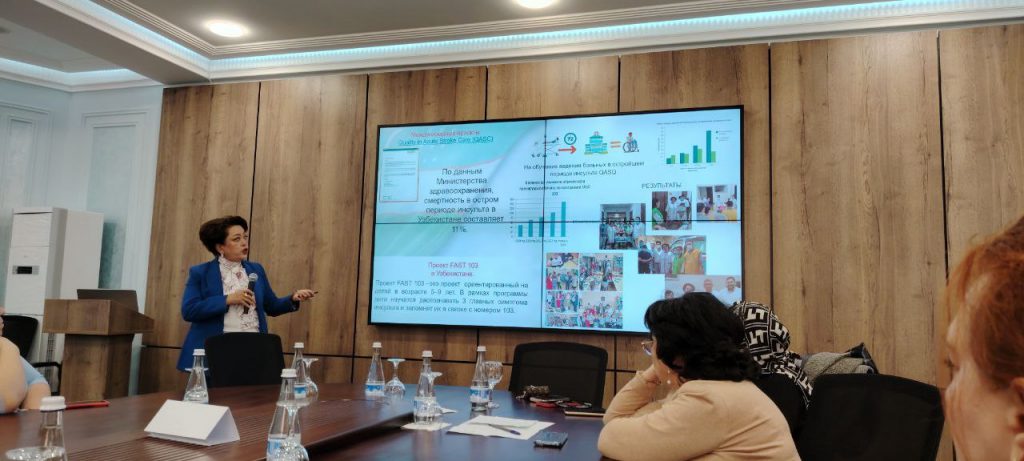
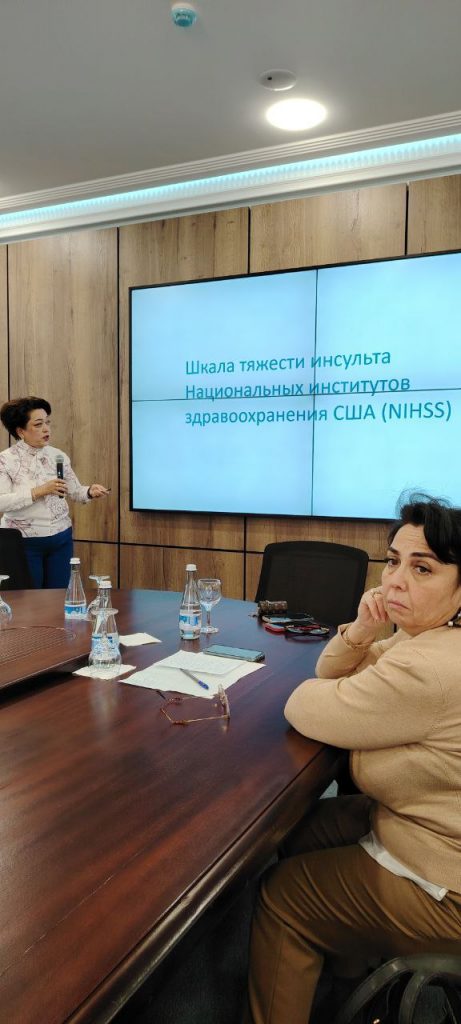
February 15, 2024 at 10:00-15:00 Deputy Madjidova Yo.N. and Nurmetova Sh.O. At the initiative of the Republican Children's Psychiatric Hospital named after U.K. Kurbanov, a medical examination was organized with the participation of specialists from St. Petersburg, Russia, with the participation of masters and clinical coordinators of the department of neurology, child neurology and medical genetics.
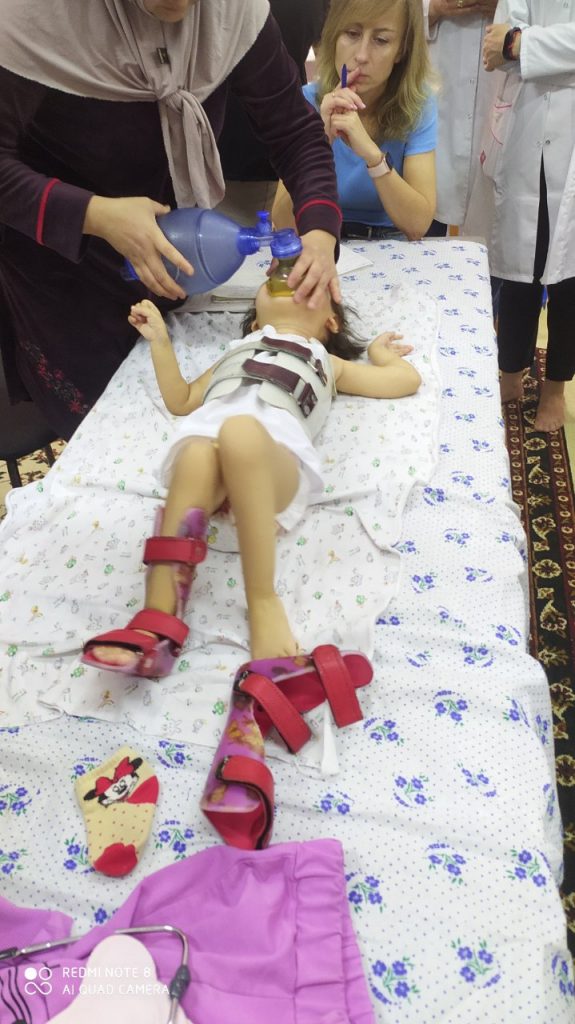
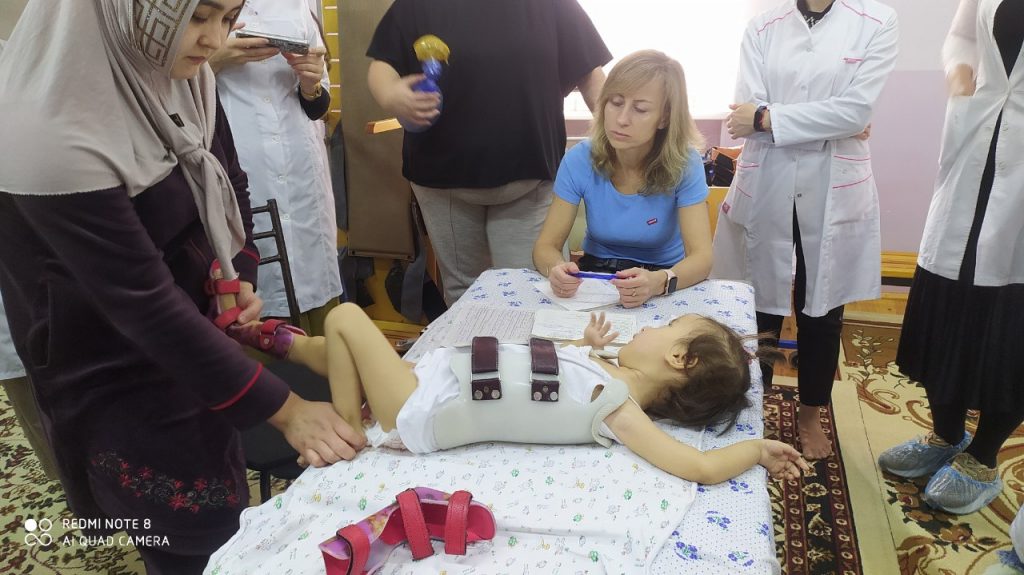

Report on the 18th International Congress on Neurorehabilitation
From June 22-23, a series of courses was held, within the framework of the memorandum of understanding and SAP-E, which took place at the Hilton Tashkent City hotel
The course aimed to familiarize participants with various fundamental and complex topics regarding dysphagia, starting with its importance in medical practice and healthcare. Careful research into normal and impaired swallowing has provided the basis for understanding the difficulties associated with dysphagia. Despite the huge variety of underlying diseases, the course focused not only on post-stroke dysphagia.
The Identifying Swallowing Disorders section allowed participants to recognize subtle but important signs and symptoms that indicate a swallowing disorder. And it continued with an in-depth discussion of the Diagnosis to Treatment pathway, explaining the processes involved in formulating a strategic, individualized treatment plan.
The section entitled “Special Considerations” addressed the unique characteristics and considerations associated with dysphagia and tracheostomy patients, increasing participants’ understanding of the nuances of this condition.
Finally, the course featured a session on “Practical Implementation Plan.” This highly interactive hands-on segment allowed participants to apply the knowledge and techniques learned during the course, providing an opportunity to consolidate knowledge and improve skill acquisition
Lecturers and trainers for this course:
1. Prof. Dr. Stefanie Duchac has been Professor of Speech Therapy at the SRH University of Applied Medical Sciences in Germany since 2018. Prior to this, she had many years of experience as a clinical academic speech therapist, particularly in the area of swallowing disorders (dysphagia).
She is the initiator of the digital dysphagia continuing education portal and dysphagia mentoring program in Germany, and co-founder of the first German-language dysphagia podcast
2. Björn Degen is a speech therapist working exclusively with patients with swallowing disorders in the Greater Area of Vienna since 2011. Together with his team and colleagues, he is developing pathways for the diagnosis and treatment of patients with dysphagia with or without tracheostomy in inpatient and rehabilitation settings, as well as in long-term care and home care settings.
This series of dysphagia courses has been an enriching and educational experience for all participants, enabling them to provide expert care to people suffering from dysphagia.

